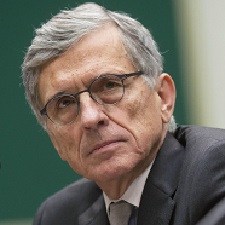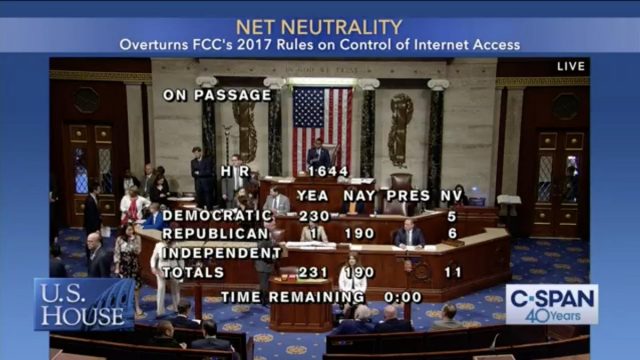
Wheeler
Three developments — two in the courts and another at the ballot box — have encouraged former FCC Chairman Thomas Wheeler to believe net neutrality can be restored, but only if a new Democratic majority in the House of Representatives reignites public attention on the issue and a D.C. court finds the current FCC acted recklessly in repealing the rules.
Wheeler, a visiting fellow of Governance Studies at the Brookings Institute’s Center for Technology Innovation, argues the last chapter of net neutrality has yet to be written:
The FCC’s Authority to Govern Internet Traffic Upheld by U.S. Supreme Court
On November 5, the Supreme Court declined to review the decision of the D.C. Circuit Court that twice upheld the 2015 Open Internet Rule. The industry groups that had long opposed non-discriminatory access to broadband networks had previously stopped such regulation at the D.C. Circuit. When they attempted the same thing with regard to the 2015 decision of the Federal Communications Commission (FCC), a three-judge panel ruled the FCC’s favor. The industry then appealed the panel’s decision to the entire D.C. Circuit and lost again. The industry then appealed that loss to the Supreme Court. The Supreme Court voted 4-3 (with Chief Justice Roberts and Justice Kavanaugh abstaining) to deny a writ of certiorari for the appeal. As a result, the lower court’s decision upholding the 2015 Open Internet Rule stands.
In order to overcome earlier court rulings that found the FCC lacked the authority to regulate broadband services, Wheeler redefined broadband as a telecommunications service, subject to stronger regulatory authority under Title II of the Communications Act. Under “common carrier” provisions, internet service providers could not engage in traffic discrimination. The industry disagreed with Wheeler’s reclassification and sued. Because the Supreme Court refused to hear their appeal, the D.C. District Court ruling in favor of the FCC stands.
Trump’s FCC Becomes a Partner of Big Telecom
The Trump Administration appointed a Republican majority to the FCC that wiped away or repealed most of the accomplishments of the FCC under Chairman Wheeler, including net neutrality.

Pai
“In 2017, the Trump FCC repealed the Open Internet Rule at the request of the network companies. In the process, the FCC also ruled that the agency had only minimal authority over internet networks,” Wheeler wrote. “Except for toothless transparency requirements, the Commission would exercise no oversight over broadband internet access services. Not only did the agency created by Congress to oversee the nation’s networks walk away from that responsibility, but it also joined with the plaintiffs in asking the Supreme Court to overrule the D.C. Circuit’s 2015 decision. When the High Court denied that request, it breathed new life into the 2015 Open Internet Rule.”
Wheeler was gratified by the news that Democrats have retaken the House, noting that presumptive Speaker Nanci Pelosi, next chairman of the Energy & Commerce Committee Frank Pallone, and incoming chairman of the Telecommunications Subcommittee Mike Doyle are all vocal supporters of net neutrality. Reps. Pallone and Doyle even attempted to introduce a resolution to repeal the FCC’s decision on net neutrality, but Republicans refused to allow the issue to come up for a vote in the House.
Wheeler believes both congressmen will conduct more aggressive oversight hearings over the FCC, but until Republicans are voted out, net neutrality “is a long shot” according to Wheeler.
 “Even if it was passed by the House, the Republican-controlled Senate would not likely support it. Even if they miraculously passed a bill, President Trump would no doubt veto it, having previously spoken out against net neutrality,” Wheeler said. “The only foreseeable legislative path would be with the support of the network companies, and that support would come at the price of watering down the proposal to render it virtually meaningless.”
“Even if it was passed by the House, the Republican-controlled Senate would not likely support it. Even if they miraculously passed a bill, President Trump would no doubt veto it, having previously spoken out against net neutrality,” Wheeler said. “The only foreseeable legislative path would be with the support of the network companies, and that support would come at the price of watering down the proposal to render it virtually meaningless.”
Will a Court Find Trump’s FCC “Arbitrary and Capricious?”
On Feb. 1, the D.C. Circuit Court will hear arguments over a lawsuit challenging the FCC’s decision to repeal net neutrality. Wheeler says if the D.C. Circuit rules against the FCC and vacates the decision to repeal net neutrality, Wheeler’s 2015 Open Internet rules will be reinstated.
“In their zeal to gut oversight of their activities, the internet networks and their Trump FCC allies may have shot themselves in the foot,” Wheeler wrote. “There is a strong case that the Trump FCC acted in an arbitrary and capricious manner when it repealed the 2015 Open Internet Rule and walked away from any responsibility over the most important network of the 21st century. If the D.C. Circuit makes such a finding, net neutrality would once again be the law of the land. Although the Trump FCC would probably spitefully ignore its enforcement and even force adoption of a new rule to free the broadband companies, that action would simply bolster the Democrats in the House.”


 Subscribe
Subscribe
 T-Sprint’s argument is that this transaction will accelerate the deployment of 5G technology in a war for 5G supremacy with China. But exactly what technology is deployed, on what spectrum, using small cells or macro cell towers, makes a lot of difference. China’s wireless companies are owned and controlled by the Chinese government, which is also underwriting some of the costs. America’s networks are financed with private capital (and customer bills). T-Sprint’s 5G plans are also far less ambitious than those from AT&T and Verizon, and the cost to long-term competition is too high. The FCC should know that.
T-Sprint’s argument is that this transaction will accelerate the deployment of 5G technology in a war for 5G supremacy with China. But exactly what technology is deployed, on what spectrum, using small cells or macro cell towers, makes a lot of difference. China’s wireless companies are owned and controlled by the Chinese government, which is also underwriting some of the costs. America’s networks are financed with private capital (and customer bills). T-Sprint’s 5G plans are also far less ambitious than those from AT&T and Verizon, and the cost to long-term competition is too high. The FCC should know that. The House on Wednesday approved a bill on a 232 to 190 vote along party lines to restore net neutrality protections first adopted in 2015, but repealed in 2018 by the Republican majority serving the Trump Administration’s Federal Communications Commission under the leadership of Chairman Ajit Pai.
The House on Wednesday approved a bill on a 232 to 190 vote along party lines to restore net neutrality protections first adopted in 2015, but repealed in 2018 by the Republican majority serving the Trump Administration’s Federal Communications Commission under the leadership of Chairman Ajit Pai.

 AT&T began laying off thousands of workers Monday, mostly targeting highly skilled and highly paid long-time AT&T employees nearing retirement age.
AT&T began laying off thousands of workers Monday, mostly targeting highly skilled and highly paid long-time AT&T employees nearing retirement age.

 “Even if it was passed by the House, the Republican-controlled Senate would not likely support it. Even if they miraculously passed a bill, President Trump would no doubt veto it, having previously spoken out against net neutrality,” Wheeler said. “The only foreseeable legislative path would be with the support of the network companies, and that support would come at the price of watering down the proposal to render it virtually meaningless.”
“Even if it was passed by the House, the Republican-controlled Senate would not likely support it. Even if they miraculously passed a bill, President Trump would no doubt veto it, having previously spoken out against net neutrality,” Wheeler said. “The only foreseeable legislative path would be with the support of the network companies, and that support would come at the price of watering down the proposal to render it virtually meaningless.”